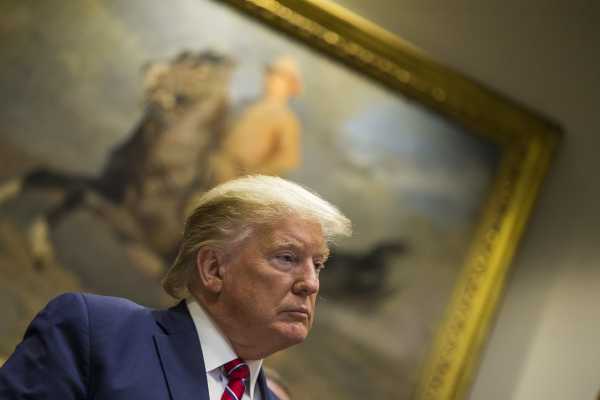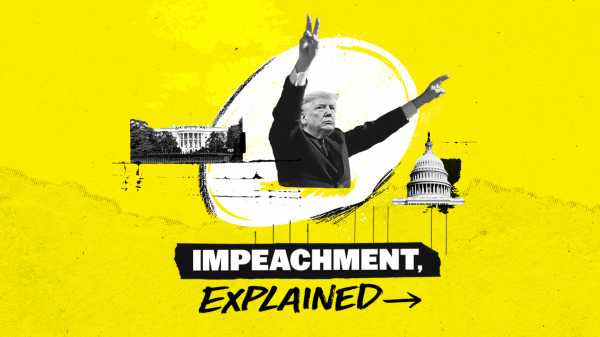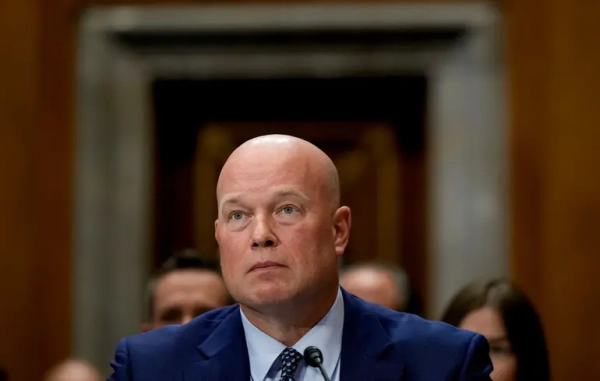
House Democrats have introduced two articles of impeachment against President Donald Trump, both of which are narrowly focused on the Ukraine scandal: The first article charges the president with abuse of power and the second article charges him with obstruction of Congress.
Before today’s announcement, it was unclear whether Democrats would charge the president with obstructing justice during special counsel Robert Mueller’s probe, for which there’s plenty of evidence.
Their decision not to do this raises an interesting legal question: what’s the difference between obstructing justice and obstructing Congress? If obstructing justice means “corruptly” impeding an investigation, then doesn’t the White House’s deliberate undermining of Congress’ investigation into Ukraine meet that threshold?
A few weeks ago, I asked Brianne Gorod, who serves as chief counsel at the Constitutional Accountability Center, to explain what obstruction of justice actually means, when it does and doesn’t apply, and if the president has indeed committed it.
And in light of today’s news, I reached out to her once again to ask if obstruction of Congress is actually different from obstruction of justice, and why the distinction matters.
I’ve added her response to the transcript of our previous conversation below.
Sean Illing
What is obstruction of justice?
Brianne Gorod
Obstruction of justice occurs when you corruptly influence or endeavor to corruptly influence a pending or official proceeding. That can be a court proceeding or a criminal investigation or a congressional investigation.
For purposes of criminal law, there are a number of questions that you have to ask.
One, was there an official proceeding? Two, was there an attempt to obstruct it? And three, did the person act with a corrupt or improper state of mind? That’s the criminal law.
Totally separate and apart from that, there is obstruction of justice as an impeachable offense. In the Constitution, the framers use the language “high crimes and misdemeanors.” And this can be a little confusing because they used that word crime, but they’re not referring to provisions of the US criminal code.
What they were talking about there were abuses of the public trust. Officials, including the president, using their powers in an effort to benefit themselves rather than the nation. And so it’s important to keep those two things separate because there can be obstruction of justice that is impeachable and warrants an official’s removal from office, totally apart from the question of whether the criminal law has been violated.
Sean Illing
What sorts of actions would be considered obstructing justice?
Brianne Gorod
It can be attempting to get an investigation to narrow its scope. It can be attempting to interfere with witness testimony. It can be attempting to interfere with evidence that the investigation may be trying to uncover. Basically, anything that can prevent investigators from doing their work, or anything that can prevent a proceeding from being carried out, falls under the umbrella of obstruction.
Sean Illing
Everything seems to turn on this notion of “improper purpose,” or the other phrase I hear often is “corruptly influence.” What are the kinds of things that prosecutors would look at to determine whether someone was “corruptly” influencing an investigation or acting with “improper purpose”? How do you prove intent?
Brianne Gorod
That’s a tricky question across the span of criminal offenses. After all, how do you prove what was going on in someone’s mind?
But courts can also look at circumstantial evidence to understand what was motivating the person. And so the question at the end of the day is, in the context of a criminal prosecution, can the prosecutor prove beyond a reasonable doubt that this person was acting with an improper purpose? Were they trying to prevent this investigation from going forward in the way that it should have with an improper reason in mind?
Sean Illing
The obstruction statute doesn’t require that justice was actually obstructed — only that the person endeavored to impede justice, right?
Brianne Gorod
That’s absolutely right. And it’s true for the criminal code and it’s true for impeachment as well. There’s certainly no requirement that the person who was trying to object instruct justice had to be successful. The point is that they were trying to interfere with an investigation.
In the case of Trump, for example, there are a lot of indications that he tried to obstruct and his subordinates didn’t listen to him and didn’t follow his commands. But that doesn’t matter. The American people should not have to hope that the president’s subordinates won’t listen to his directions.
Sean Illing
Is obstruction of justice impeachable on its face?
Brianne Gorod
Yes. It’s something that we saw in the Nixon impeachment. It’s something that we saw in the Clinton impeachment articles. And it’s something that has regularly come up in this context because it’s a prime example of the president using the powers of his office to benefit himself rather than the American people.
It’s incredibly important that we have this check on obstruction of justice because it goes to the integrity of our justice system, both within the courts and within the political process. It goes to the integrity of our constitutional system. If there have been allegations of wrongdoing, if there have been allegations of abuses of the public trust, it’s crucial that the American people be able to know the truth of what happened.
And so if a president is willing to abuse the official powers of his office to prevent the American people from knowing the truth, from knowing what happened, that’s deeply corrosive to our system of government.
Sean Illing
The Democrats have now charged Trump with “obstruction of Congress.” How is that different from obstruction of justice? And why does the distinction matter?
Brianne Gorod
The House’s resolution appears to focus in particular on the ways in which the president has been obstructing Congress’s impeachment inquiry. In this context, obstruction of Congress is essentially a type of obstruction of justice — the allegation is that the president has been trying to obstruct a lawful government investigation – but it’s more focused than an obstruction of justice charge that might also have encompassed, for example, the president’s interference with Special Counsel Mueller’s investigation.
Sean Illing
Is the president guilty as charged in your opinion?
Brianne Gorod
The House’s resolution certainly makes out a compelling case that the president has been obstructing Congress, focusing in particular on the unprecedented nature of his obstruction.
As the resolution says, “no president has ever ordered the complete defiance of an impeachment inquiry or sought to obstruct and impede so comprehensively the ability of the House of Representatives to investigate ‘high Crimes and Misdemeanors.’”
There is real irony in the president abusing executive power to undermine the very constitutional process the nation’s Founders intended as a check on abuses of executive power.
Sean Illing
There are a lot of arguments being thrown around that make the case that the president cannot be charged with obstruction of justice. The president is the chief law enforcement officer in the country. He or she has the authority to hire or fire subordinates. He or she has the authority to tell those subordinates to pursue or to not pursue investigations.
Do you buy that in any way?
Brianne Gorod
Absolutely not. I think that gets it fundamentally wrong. The founders included impeachment as a check on the presidency precisely because they recognized how many powers the president had and they recognized that those powers could be subject to abuse.
There are any number of powers that the president has that are lawful, but if you use them for improper purposes, if you use them to try to impede an investigation, to try to prevent the American people from learning the truth, that can itself be impeachable and it doesn’t matter whether it’s a power that the president could use for a lawful purpose.
Your guide to the Donald Trump impeachment saga

Understand the impeachment process, from its history to what comes next. Explore the full guide here.
Sean Illing
If I am a Republican voter or lawmaker who generally approves of the job that Trump is doing, why should I be concerned that he is obstructing justice? Why, in other words, is this a problem worth worrying about?
Brianne Gorod
Because the kind of abuses that the president has engaged in are deeply corrosive to our system of government. And I would imagine that Republicans, if the party labels were turned around, would be deeply disturbed by the idea of a Democratic president trying to encourage foreign interference in our elections, trying to encourage or prevent an investigation designed to uncover the truth of that.
Our constitutional system depends on checks and balances. It depends on the precept that no one including the president is above the law. And that’s something that everyone across both sides of the aisle should be able to agree on.
Sourse: vox.com






